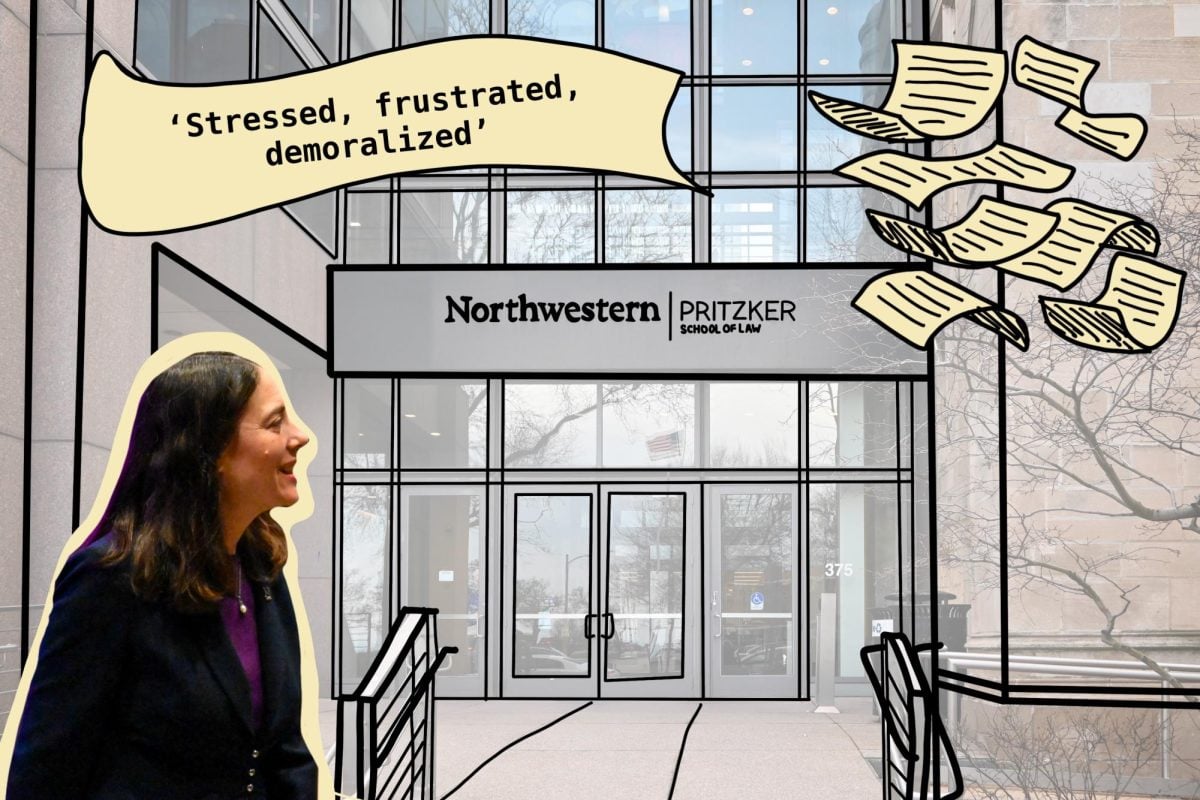Disclosure is vital for treating mental health. No one knows that better than Terri Weaver.
While studying abroad in London in November, her daughter, Weinberg junior Alyssa Weaver, committed suicide. Shocked by her daughter’s death, Terri Weaver, 55, retired early to cope with the pain.
“Alyssa died because she didn’t tell anybody,” she said.
Alyssa Weaver’s death sparked a series of conversations on campus about the quality and accessibility of Northwestern’s mental health resources. That dialogue has been amplified in recent weeks with the death of McCormick sophomore Dmitri Teplov, who committed suicide on campus earlier this month.
Although many students consider studying abroad one of their most enriching college experiences, some say it can be emotionally stressful. Thousands of miles from campus, students are separated from family, friends and familiar territory.
“If we’re not educated about these issues on campus before we go, it’s harder to deal with them,” said Medill senior Zach Wichter, whose anxiety condition worsened during a 2010 trip to Malawi organized by the journalism school. “There wasn’t really any information coming from the University about what the symptoms were and how to deal with them.”
The inadequate resources Wichter encountered underscore a problem University officials are working to combat. As the community mourns the death of a third student this academic year, administrators are revamping what many view as a lacking screening process for studying abroad to prevent students like Alyssa Weaver from falling through the cracks.
A more thorough assessment
About 750 NU students go abroad each academic year, with the majority leaving campus Fall Quarter, said Julie Friend, associate director for international safety and security in the study abroad office. About 40 percent of undergraduates study abroad during their NU career at one of more than 120 sites, according to the Office of Undergraduate Admissions.
Before studying abroad, students must fill out a health assessment form, which reminds them to consider vaccinations, medications and dietary preferences. Students are also required to purchase a health care package before leaving.
The form is a checklist with five questions related to disabilities, allergies, medication, diet and pre-existing conditions; it gives students a “yes” or “no” option and does not ask them to write notes or elaborate on any issues. If a student indicates a pre-existing condition, a health care provider must fill out an evaluation form confirming the student met with a medical practitioner to discuss travel plans and how to address medical needs abroad.
Only one question explicitly addresses mental health, asking if the student is being treated or has been treated in the past three years.
Although the form states its objective is to “enhance (students’) well-being abroad,” the short length and simple format raise questions over its effectiveness and thoroughness. Because the form is so brief, some acknowledge it can mask deeper issues and fail to identify problems that often arise abroad.
Moreover, while submitting the initial application for global journalism residencies, Medill students do not complete the form. These students do fill out some health-related paperwork before any international trip is finalized.
“It’s not just if you’re depressed that you need to be worried about it,” said Medill senior Nina Leff, who participated in the global journalism residency program in South Africa. “It can be a very emotional experience being in a foreign country. It will be.”
That concern lies at the root of the University’s push to bolster current screening procedures for study abroad applicants.
Friend says she wants to alter the questions on the form. Collaborating with Northwestern University Health Service, she is developing a set of questions to better assess students’ medical needs. John Alexander, executive director of Health Service, said he hopes to have doctors make diagnoses prior to student departures so corresponding health care plans can be coordinated with international sites.
In addition, Some medications that are legal in the United States may not be legal in other countries and access to them may be difficult.
“A lot of people think they’re going to a place like home in terms of access to health care,” Alexander said.
Adding safeguards
Friend said she wants the revised forms to be checked by a professional in Health Service, preferably an individual familiar to the student, prior to going abroad. That change will allow for better assessment of students’ needs overseas, she said.
The intent is that students with pre-existing conditions can meet with a physician to plan for all their medical needs well ahead of their departure time.
Still, Alexander acknowledges that mental health issues pose unique problems. He said anyone can perform “routine travel stuff” — including providing vaccinations and preventative medications — but only medical practitioners with knowledge of students’ needs can recommend specific mental health plans.
At this early stage, Alexander said that Health Service hasn’t sorted out staffing yet and will wait and see where this issue fits in with the University’s priorities. Ultimately, the issue is determining how to elicit the right answers from students, Alexander said.
“People don’t want to admit that they have a chronic problem of any kind,” he said.
Hoping to revise the form by this summer, Friend aims to integrate it into the online study abroad application by fall 2013. NU adopted its digitized application model from Michigan State University, where Friend previously worked.
The new form would be accessed through a secure online portal requiring students and medical practitioners to log in — an alternative to giving staff who review study abroad applications, including Study Abroad Office employees, access to medical information. The change will allow students to be more honest and thorough about disclosing mental health issues, Friend said.
“If they think that everybody in the world has access to their information, why would they disclose things?” she said.
Pre-departure preparations
Terri Weaver said her daughter went to therapy prior to studying abroad but did not find it very helpful, and she is unsure if any pre-departure screening tools could have helped. Many NU students are hardworking perfectionists; Terri Weaver said her daughter was one of them.
Before Wichter traveled to Malawi and South Africa, he consulted with a mental health professional in his hometown. However, he said the University could have done more to protect students’ mental health — both by providing explicit information about available resources and following up to ensure time spent abroad did not have a negative impact.
Although Wichter said he felt comfortable disclosing his anxiety condition, he believes not everyone speaks openly about their issues.
“If you’re going abroad, it’s important for them to know all of the things that could be triggering or dangerous for you,” he said. “You wouldn’t go abroad with a heart condition without letting the University know. For me, it was important to let them know about this anxiety and my history with it.”
Leff said she wishes emotional health was discussed in addition to pre-study abroad conversations about safe drinking. Doing so would let people know that experiencing strong emotions while abroad is normal, she said.
“Most people may never have gone to a therapist in their lives and you never know what’s going to happen,” Leff said.
The danger of not disclosing
Terri Weaver said her daughter had a history of anxiety, particularly in social contexts. However, she said any outward signs of depression must have developed during her quarter abroad. Alyssa Weaver studied visual cultures at Goldsmiths College in London, a program coordinated through Philadelphia-based Arcadia University.
“She did not talk to me — she did not talk to anyone else and that contributed to her death,” Terri Weaver said, noting that her daughter forged great relationships with the other students she knew at Goldsmiths.
Alyssa Weaver had planned on cooking Thanksgiving dinner with her flatmates the night after she took her own life. Her mother said she had even called her family to ask for assistance on cooking recipes. Communication junior Brennan Suen, who studied at Goldsmiths with Alyssa Weaver that quarter, said he interacted with her while they were both exploring Europe.
“She just got a tattoo a little while before she passed,” Suen said. “We had a blast in Berlin and nothing seemed to be wrong, but she committed suicide less than two weeks afterwards.”
Seeking health care abroad
After Alyssa Weaver’s death, Goldsmiths made special counseling available to students. However, her mother said that some students told her the support system was ineffective.
“The students that were there, some of them were traumatized,” Terri Weaver said. “They did not get the assistance needed.”
Suen said he did not use the counseling services or heavily consider health care services while studying abroad before his departure, focusing on his physical health because of slight differences in acquiring medicine in Europe. He did not plan on handling medical issues abroad, taking little time to complete the pre-departure forms, he said.
“I barely remember filling out the preliminary health evaluation, but I pretty much sped through it,” he said.
Suen said he doubts other students treat the evaluation any differently.
“It’s like the alcohol thing — who really worked hard on that?” Suen said, referencing the Essential NU program about drinking that all incoming students must complete.
Study abroad students email Friend often about alcohol issues, illnesses and minor bike accidents — problems she said are similar to the ones students encounter in Evanston. Most do not consult with her about mental health or emotional issues, she said.
Although Friend is tasked with managing these students, she trusts them to determine trip preparations and address their medical needs abroad, including visiting counselors and filling prescriptions.
Creating a ‘climate of disclosure’
NU does not preclude people from studying abroad due to any pre-existing conditions, and neither does Arcadia University, which coordinated Alyssa Weaver’s study abroad program. Instead, if an assessment identifies a student with specific mental or physical health needs, NU will help locate proper medical practitioners in or near study abroad sites.
Arcadia requires students to fill out a form assessing their health and wellness before studying abroad, which is then submitted to the University’s study abroad office, said Arlene Snyder, Arcadia’s director of health, safety and security. If additional measures need to be taken to ensure a student’s safety, a program manager will contact a physician.
Snyder said she frequently considers what issues students are willing to share and which they avoid discussing before leaving the country. She addresses mental health as she would any other physical health issue, likening it to a diabetic being prohibited from traveling abroad without access to insulin.
“We try to create a climate of disclosure,” Snyder said.
Arcadia’s current pre-departure forms are similar to those used at NU. They even require students to use the same health care provider, HTH Worldwide, a Pennsylvania-based company that caters to students studying abroad.
Friend has had extensive experience working with HTH, from her time at Michigan State University and now at NU. The provider covers students in about 400 universities in the country, HTH spokeswoman Moira Bishop said.
The culture shock of traveling abroad can lead to health problems, Bishop said. HTH works proactively with students to find a proper counselor or psychiatrist abroad, even in regions where they may not be practicing before a student’s arrival.
Bishop said that every university’s preparation for studying abroad gives HTH time to reach out to medical practitioners to ensure students get care. For 2013, 48 NU students have already purchased the package.
Starting a conversation
Those familiar with mental health issues, including Terri Weaver, acknowledge forms and pre-departure information cannot catch everything. Asking the right questions may help physicians and counselors assess medical needs, but simply talking about the problem earlier on, especially when it comes to mental health, may be what is needed most.
“I don’t know if there would have been any screening tools that would have helped (Alyssa),” Terri Weaver said.
Stigma surrounding mental health makes it difficult for students to disclose problems to peers and medical practitioners. A school like NU addresses the issue through online courses but fails to keep an ongoing discussion, Terri Weaver said.
Terri Weaver suggested a list of sources in the medical health field be made available to every student leaving the country, whether a pre-departure screening suggests so or not.
“What happens when you’re great the first few months of college but then you’re not?” she asked.
A foreign environment gives students much freedom, but adjusting to the distance can be difficult at times, Suen said.
“Being abroad makes you so removed from your world in the United States that you don’t even think about it or want to think about it,” Suen said. “It’s a microcosm of life down there where you get hit with a lot in such a short amount of time. Everything goes up and down so fast that it can be difficult.”
Correction: Due to an editing error, a previous version of this story misidentified Arlene Snyder. She is an Arcadia University official. The Daily regrets the error.













